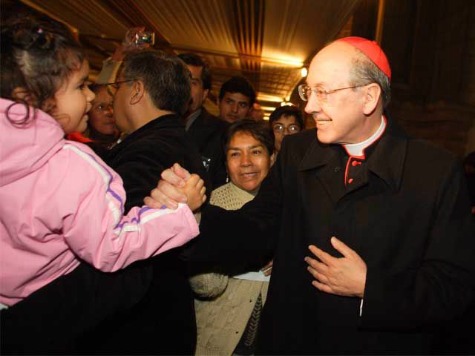
Though four in ten Catholics live in Latin America–more than in any other region of the world–most Latin Americans do not believe the next pope will be one of the area’s 19 cardinals. In fact, many Latin Americans are somewhat disinterested in the next pope.
According to Hispanically Speaking News, many Latin American Catholics feel detached from the Church, believe it is too Eurocentric, and are more concerned with having a pope who understands their region, regardless of his national background. What some hope to achieve with a new papacy is an understanding of Latin American social issues and a strengthening of local churches, as well as a sense of emotional connection with the new leader of the Roman Catholic Church.
“Independently of where the pope comes from, he will be the pope for all if he is able to understand the concerns of Latin America,” said Father Roger Araujo, a priest in Lorena, Brazil. “The people of Brazil hope the pope will understand the yearnings of the modern world.”
Evelyn Gonzalez of Santo Domingo was raised Catholic but left the Church because of its positions on condoms and abortion.
“I felt like I wasn’t being honest because there were things that I didn’t agree with that they were saying,” Gonzalez said.
But what does it mean to want a Church that is more “modern”? Many estranged Catholics from all over the world, not just Latin America, say they want the Church to change its doctrine on issues such as sexuality and abortion.
Cardinal Juan Luis Cipriani (pictured), archbishop of Lima, Peru, warns against widespread relativism and the temptation to modernize the Church.
“The bishop cannot take the most comfortable road, because he has to always seek after Christ, unity with the Pope, and manifest it with his example and his words,” Cipriani said in January. “Sex, marriage, human life and the family are being played with in this world.”
Cipriani urged the Church’s pastors to learn the value of opposing ideas rooted in relativism. He observed that this opposition involves the defense of life from the moment of conception to natural death as well as the traditional family, based on marriage between one man and one woman.
Chile has seen the percentage of people who identify themselves as Catholics drop from nearly 70% in 2002 to about 60% in 2012, according to census data, a decline that is attributed to infamous sex abuse scandals. Many who have left the Roman Catholic Church have joined evangelical churches.
Though the Church has clearly had its in-house problems, the complaints of some who have left the Church appear rooted in a philosophy of external motivation–that is, the expectation that faith can change if there is a different type of pope, one with a different personality, or one who will “modernize” Church teachings so they are more convenient to follow.
The now-Pope Emeritus Benedict, however, called for faith that comes from within, that is spurred by a desire to follow God’s call, and that this desire is what brings joy and a sense of commitment.
In June of last year, Pope Benedict acknowledged that Catholics who leave the Church to join evangelical Christian churches often do so because they do not experience a sense of joy and community within their Catholic parishes, rather than due to disagreements with doctrine.
The pontiff told a delegation of Colombian bishops at the Vatican:
Often sincere people who leave our Church do not do so as a result of what non-Catholic groups believe, but fundamentally as a result of their own lived experience; for reasons not of doctrine but of life; not for strictly dogmatic, but for pastoral reasons; not due to theological problems, but to methodological problems of our Church.
The pope’s comments were specifically targeted to the Church in Latin America, where “the increasingly active presence of Pentecostal and Evangelical communities… cannot be ignored or underestimated.”
This is an essential point that Pope Benedict makes: that not only is the Church not going to change its doctrine or teachings in order to “modernize” itself, but also that doctrine, when understood, is a pathway, and not an obstacle to, the joy associated with faith. It is this concept that is largely behind the pope’s “New Evangelization” and his naming the current year “The Year of Faith.”
The pontiff said that the increase in conversions among Latin Americans to evangelical churches demonstrates that Christians feel called “to purification and the revitalization of their faith.” He urged Catholics to become “better believers, more pious, affable and welcoming in our parishes and communities, so that no-one feels distant or excluded.”
Pope Benedict also called for Catholic leaders in Latin America to provide better catechesis–especially to young people–with well-prepared homilies during Mass and the promotion of Catholic doctrine in schools and universities.
In January of 2012, the pope said, “We are facing a profound crisis of faith, a loss of a religious sensewhich represents one of the greatest challenges for the Church today.”

COMMENTS
Please let us know if you're having issues with commenting.